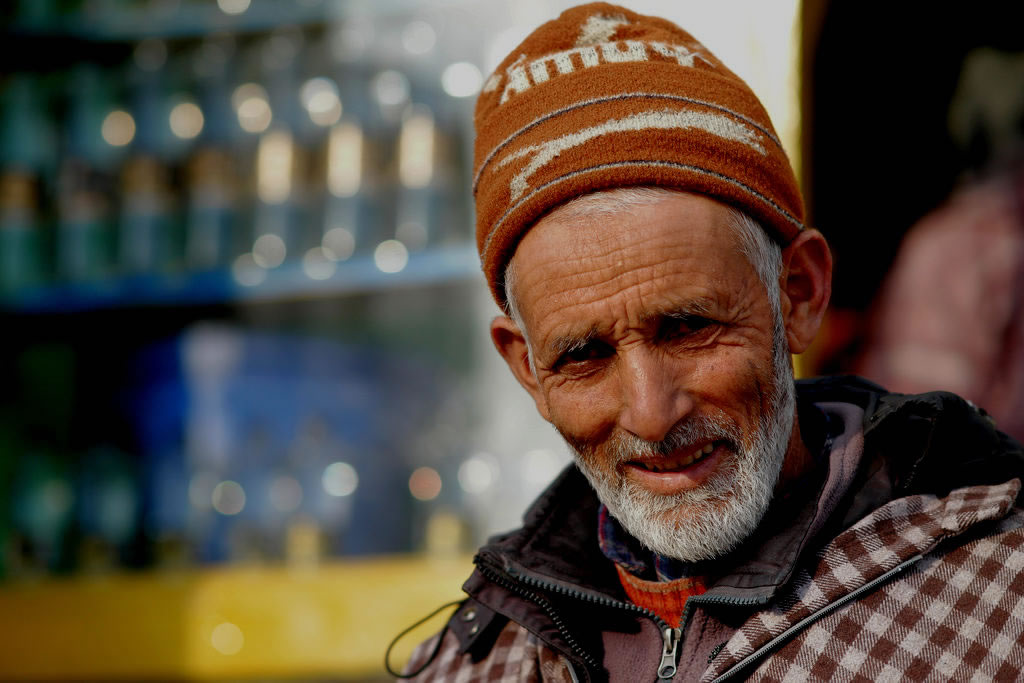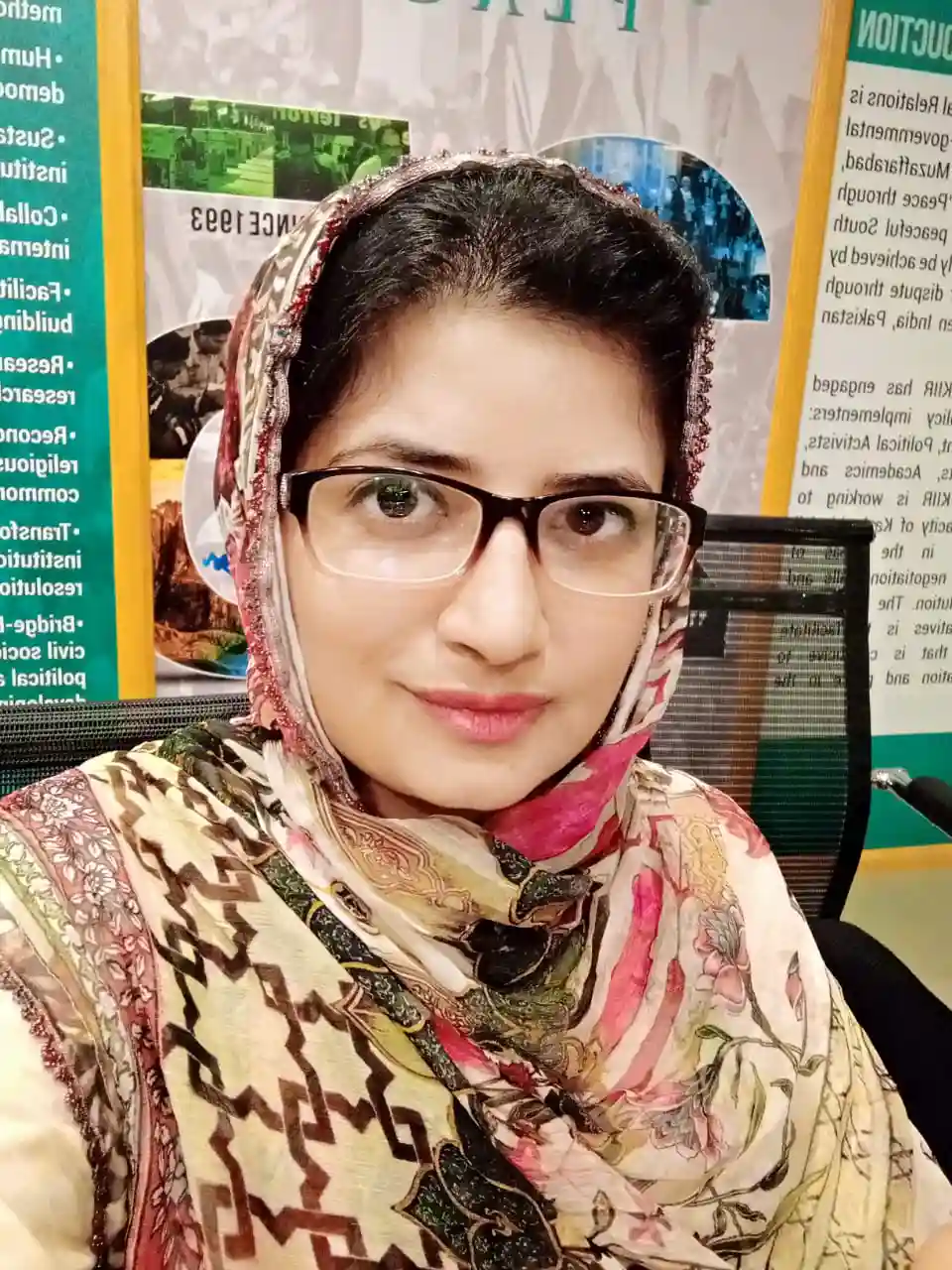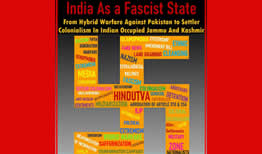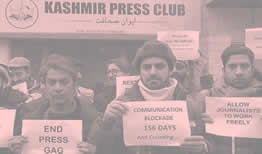The Role of International Organizations in Addressing the Jammu and Kashmir Conflict
The Role of International Organizations in Addressing the Jammu and Kashmir Conflict
Abstract:
International organizations such as the United Nations (UN), Amnesty International, and others have given close attention to the long running territorial dispute between India and Pakistan known as the Jammu and Kashmir conflict. United Nation measures, such as UNSC Resolution 47, which called for a vote, have been hindered by lack of enforcement and political complications.
By
Hasnain Khan
Semester 7th ABDUL WALI KHAN UNIVERSITY MARDAN
Amnesty
International has actively brought attention to human rights violations in the area, but Indian dismissive attitude has
diminished its impact. International mediation is becoming more complex due to
strategic alliances that favor geopolitical interests over conflict resolution,
such as the cooperation between the United States and India and China and
Pakistan. Apart from these challenges, creative approaches like encouraging
comprehensive communication, improving accountability for human rights, and
utilizing technology are essential for a durable peace.
Nonetheless, political, security, and legal barriers continue to impede the work
of humanitarian organizations, making ending the conflict peacefully difficult.
KEYWORDS:
Jammu and Kashmir Conflict, United Nations, Human Rights Violations, Peace
Keeping, Humanitarian Challenges, International Organizations, Dialogue and
Negotiation
Introduction:
One
of the most violent and long-lasting disputes in the globe is still the
long-running territorial dispute between India and Pakistan over Jammu and
Kashmir. Known for its stunning scenery and strategic importance, this area has
seen significant human rights violations, political unrest, and acts of
violence since British India was divided in 1947. The territory is largely
claimed by both India and Pakistan, although only portions of it are under
their authority. As a result, there is ongoing instability and a recurring
military conflict. International organizations like the United Nations(UN),
Organization of Islamic Cooperation(OIC), European Union(EU), (ICRC) and
Amnesty International have been crucial in tackling different aspects of the
conflict, such as peacekeeping, mediation, and human rights advocacy, among
this complicated geopolitical terrain. This paper examines these
organizations functions, effects, and
difficulties.
The
United Nations has been involved in the conflict in Jammu and Kashmir from its
inception. The UN Security Council (UNSC) adopted Resolution 47, which called
for a plebiscite to provide the people of Jammu and Kashmir the opportunity to
decide their own future, in the wake of the first Indo-Pak war over Kashmir in
1947–1948. In order to facilitate this plebiscite, the resolution further
suggested that Indian military forces and Pakistani tribesmen evacuate (Lamb,
1991). The United Nations Commission for India and Pakistan (UNCIP) was founded
to aid in these endeavors. However, the resolution's effective implementation
was hampered by Pakistan's and India's divergent interpretations of it as well
as the absence of a strong enforcement mechanism.
The
European Union (EU) and the Organization of Islamic Cooperation (OIC) have also
addressed the Jammu and Kashmir dispute from their various vantage points. As
the voice of the Muslim world as a whole, the OIC has frequently defended
Kashmiris rights and voiced support for Pakistan position (Ahmed, 2010). With a
focus on democratic principles and human rights, the EU has worked to advance
communication and amicable settlement through diplomatic channels (Trilokekar,
2019). These organizations, which represent a variety of interests and
approaches, contribute to an international reaction with multiple facets.
Even
though it is less obvious, the International Committee of the Red Cross (ICRC)
is also very important to the conflict. The ICRC is an impartial humanitarian
organization that has helped those affected by violence and war in Jammu &
Kashmir. Its main priorities have been to assist those impacted by violence,
which includes making sure that international humanitarian law is followed,
assisting the release of prisoners, and offering medical care (ICRC, 2013, according
to Wikipedia). The humanitarian impact of the violence is brought to light by
the ICRC's work, which also emphasizes the necessity of conflict resolution
initiatives that put the rights and wellbeing of other people first.
Amnesty
International has taken the lead in exposing and denouncing violations of human
rights in Jammu & Kashmir. The group has released multiple studies on
topics like enforced disappearances, extrajudicial killings, torture, and the
use of pellet guns by Indian security personnel against civilians. These
studies have played a significant role in drawing attention to the human rights
situation in Jammu and Kashmir on a global scale and in pressuring the
governments of India to uphold international
human rights norms.
Amnesty International has also started a
number of efforts to increase public awareness of Kashmir human rights plight
worldwide. Repressive laws like the Armed Forces Special Powers Act (AFSPA) are
frequently called for to be repealed in these efforts. which gives security
officers broad authority and shields them from legal action. Through the use of
international forums and public opinion mobilization, Amnesty International
aims to put pressure on the Indian government to change its policies and hold
those responsible for human rights violations accountable.
A
comprehensive review of the efforts, achievement, and limitations of
international organizations is necessary for understanding their role in the
Jammu and Kashmir conflict. This research paper will examine the historical and
current roles of these organizations, analyzing their contributions to conflict
management, peacebuilding, and humanitarian assistance, as well as their impact
and effectiveness.
Strategic
alliances of major power
Since
its beginning in 1947, the Jammu and Kashmir conflict a territorial dispute
mainly between India and Pakistan has attracted attention and participation
from other countries. Over the years, the effectiveness of international
organizations, especially the United Nations (UN) and other in addressing the
conflict has been greatly impacted by the engagement of major countries through
strategic alliances with Pakistan and India. The conflict is no longer just a
regional problem but also a pawn in the dynamics of global power because of
these partnerships, which have influenced human rights advocacy activities,
resolution enforcement, and diplomatic stances.
Strategic
Alliances with India
United
States-India Relations:
Since the end of the Cold War, the strategic
partnership between the United States and India has expanded significantly,
especially in the 2000s. Because of our common goals of advancing democratic
ideals, strengthening economic links, and thwarting Chinas growth, our
cooperation has grown into a crucial alliance. Generally speaking, the United
States has supported India's position on Kashmir, especially after 9/11 when
fighting terrorism emerged as a major international security concern. India has
presented the Kashmir dispute in a way that serves American interests by seeing
it as a component of its larger campaign against terrorism. (G.Tellis, 2008).
This
strategic alliance has significantly impacted how well foreign interventions in
Kashmir have worked. As a permanent member of the UN Security Council, the
United States has substantial sway over the passage and implementation of
resolutions. Foreign pressure on India over Kashmir has frequently decreased as
a result of the strengthening ties between the United States and India. For
example, the United States has mostly abstained from pressuring India on human
rights matters in Kashmir, preferring to concentrate on more expansive
geopolitical and commercial objectives. This has made it more difficult for the
UN to vigorously address purported abuses of human rights in the area.
Russia-India
Relations:
Russia,
India historical partner, has continuously backed India stance on Kashmir.
Resolutions that were detrimental to India were blocked by the Soviet Union
during the Cold War by using its veto power in the UN Security Council,
especially those that attempted to impose a plebiscite or internationalize the
Kashmir dispute (Chari, 2001). Russia and India have maintained a close
alliance since the end of the Cold War, with Russia frequently supporting India
in international a forum.
The
effectiveness of the UN in resolving the Kashmir conflict has been further
limited by this strategic alliance. The Russian veto has historically ensured
that any resolution viewed as anti-India is unlikely to pass, thereby limiting
the scope of international intervention in Kashmir. Russia's support for
India's sovereignty and territorial integrity has discouraged international
organizations from adopting a more militant approach.
Strategic
Alliances with Pakistan:
Pakistan-China
Relations:
The
China strategic relationship with Pakistan, has played a major role in the
Kashmir dispute. China see Pakistan as a counterweight to India power in South
Asia, hence it has helped Pakistan militarily and diplomatically. Given China
and India territorial issues, which include those involving portions of Jammu
and Kashmir, this partnership is especially pertinent. (A.Small,2015)
The
effectiveness of international initiatives in Kashmir has been impacted by
China assistance for Pakistan in a number of ways. For example, China has
occasionally blocked or altered decisions that are detrimental to Pakistan by
using its position in the United Nation Security Council. Furthermore, China
backing gives Pakistan more confidence to stick to its hardline position on Kashmir,
making it more challenging for international organizations to mediate or
encourage communication between India and Pakistan. Because China frequently
defends Pakistan from international criticism, this partnership also makes it
more difficult for the United Nation and other international organizations to
put pressure on Pakistan on matters like cross-border terrorism.
Islamic
World and OIC:
International
involvement in Kashmir have also been impacted by Pakistan strategic
relationships within the Islamic world, particularly its leadership position in
the Organization of Islamic Cooperation. The OIC has continuously backed
Pakistan position on Kashmir, characterizing the dispute as a matter of human
rights and advocating for the execution of UN resolutions that encourage a
referendum. (M.Cheema,2016)
The
OIC has been successful in keeping the Kashmir issue alive in international
venues, despite having little influence on the UN. The strategic interests of
the OIC member states, however, frequently compromise the efficacy of its
efforts. For instance, the OIC denounces human rights abuses in Kashmir in its
declarations, but members with close economic ties to India, such Saudi Arabia
and the United Arab Emirates, have been hesitant to take decisive action
against India. This dichotomy lessens the OIC's advocacy overall impact and
lessens the pressure on India to end the dispute in a way that meets
international standards. (Qureshi, 2010).
Innovative
Strategies
From
last 75 years, the Jammu and Kashmir conflict is still a deeply ingrained
socio-political problem. The conflict is complicated and involves issues of
national sovereignty, religious identity, and geopolitical rivalry. Despite the
efforts of international organizations, especially the United Nations (UN), to
mediate and resolve the conflict, these efforts have largely failed.
International organizations need to use creative solutions that transcend
conventional military and diplomatic means in order to reach a long-lasting and
peaceful settlement. To increase mutual confidence and collaboration amongst
the parties involved in the conflict, these tactics ought to prioritize
encouraging communication, resolving issues related to human rights, advancing
economic development, and making use of technology.
Encouraging
Constructive Conversation and Settlement:
A
primary obstacle to settling the dispute in Jammu and Kashmir is the absence of
comprehensive discourse involving all pertinent parties, such as India,
Pakistan, and the local populace. By serving as impartial mediators,
international organizations can be extremely helpful in promoting this kind of
conversation. Since the local community is the one most impacted by the
conflict, traditional diplomatic approaches frequently fall short. Thus, an inventive
strategy would be to establish a multi level conversation forum with
representatives from many communities and areas in Jammu and Kashmir in
addition to the governments of India and Pakistan.
With
the intention of promoting mutual respect and understanding between the many
stakeholders, this platform might function under the authority of the UN or
another reputable international organization. The platform might be made to
facilitate both official talks and casual exchanges aimed at fostering trust, which
would foster a favorable atmosphere for resolving disputes. Involving
international specialists, local leaders, and civil society organizations in
this discussion process could also assist guarantee that the needs and
viewpoints of the Kashmiri people are sufficiently represented.
Encouraging
Accountability and Human Rights:
In Jammu and Kashmir, human rights violations have been a major source of grievances, which has promoted local and suspicion hostility. Widespread violations Indian authorities have been documented by international organizations including as Human Rights Watch. (HRW, 2019) International organizations should take a more proactive and consistent stance when advocating for human rights in Jammu and Kashmir in order to address this problem. One way to do this would be to set up an impartial international commission to keep an eye out for and document abuses of human rights in the area.
To
guarantee that those responsible for violations are held accountable, this
commission can collaborate closely with regional human rights organizations to
obtain proof. International organizations may also advocate for the adoption of
measures aimed at fostering confidence, like the abolition of curfews, the
release of political prisoners, and the restoration of civil liberties, by
using their diplomatic clout. By taking these steps, the parties involved in
the conflict may be able to establish confidence and foster a more favorable
atmosphere for peace negotiations.
Utilizing
Technology for Conflict Resolution:
Through encouraging transparency, fostering trust, and facilitating communication, technology can revolutionize the way that conflicts are resolved. International organizations can use technology in Jammu and Kashmir to improve their efforts at resolving conflicts in a number of ways. Digital platforms can be used to help the parties in conflict communicate with one other more effectively. For instance, representatives from Jammu and Kashmir, Pakistan, and India can hold discussions via virtual dialogue platforms without the logistical difficulties associated with in-person gatherings. Additionally, these platforms can offer a venue for public participation in the peace process by civil society organizations, fostering inclusivity and openness.(Sinha,2021)
Real-time
monitoring and reporting of human rights breaches can be facilitated by
technology. It is possible for international groups to create and implement
smartphone applications that give people in Jammu and Kashmir the ability to
anonymously report violent or abusive occurrences. Local human rights
organizations can then confirm these findings, and they can be used in global
advocacy campaigns. Other remote sensing technologies and satellite photos can
be used to monitor military activity and possible ceasefire violations in the
area.
Engaging
International Stakeholders:
Any
long-term settlement of the Jammu and Kashmir dispute requires the
participation of international parties, notably the United States and the
European Union. These nations can be helpful in fostering communication and
advancing peace because they have a influence over Pakistan and India.
It
is the responsibility of international organizations to involve these parties
in a concerted attempt to end the war. This can entail forming an international
contact group with members from major world powers. The contact group can
endeavor to bring these countries
interests into line with the objective of reaching a peaceful settlement
in Jammu and Kashmir. Furthermore, international organizations might use these
countries economic and political clout to advocate for the adoption of programs
that promote peace, such as confidence-building measures.(Kapur,2011)
Challenges
Faced by International Humanitarian Organizations:
Since 1947, the Jammu and Kashmir area
has been the center of hostilities between India and Pakistan, resulting in an
ongoing humanitarian crisis. Serious human suffering, including deaths,
displacements, and sexual abuses of fundamental human rights, have been brought
about by this ongoing conflict. Numerous non-governmental organizations (NGOs),
the United Nations (UN), and the International Committee of the Red Cross
(ICRC) are among the international humanitarian groups that have made an effort
to assist and support the impacted populations. But a number of obstacles
arising from the region intricate political, security, logistical, and legal
milieu usually impede their attempts. These challenges significantly restrict
these organizations capacity to successfully fulfill their tasks in the area.
Challenges
in Politics and Diplomacy:
Navigating the delicate and complicated
political terrain in Jammu & Kashmir is one of the biggest challenges
facing international humanitarian groups. Both India and Pakistan assert
territorial claims in the area and maintain a sizable military presence within
their respective domains. There are severe limitations on the operations of
international organizations since the Indian government, in particular,
considers any foreign engagement in Kashmir as meddling in its own affairs.
These limitations frequently include being unable to enter areas of violence
and taking longer to obtain the required permits to operate.(Bose,2003)
The
politically charged atmosphere makes it more difficult to uphold the
impartiality required for humanitarian operations. Delivering help may become
more difficult if a government loses cooperation due to any perceived bias on
the part of an organization. Additionally, the ongoing diplomatic hostilities
between Pakistan and India. Many humanitarian projects are carried without any restriction in Azad Kashmir,
while in Indian-occupied Jammu and Kashmir, Humanitarian organizations that are
prohibited from operating there regularly interfere with humanitarian efforts
on the grounds that they believe the other is using aid for political ends. It
is challenging for international organizations to operate efficiently and
preserve the objectivity necessary to provide aid fairly because of this
widespread skepticism.
Security
Risks and Access Limitation:
Another significant barrier for humanitarian
organizations working in Jammu & Kashmir is security concerns. Violence is
a common occurrence in the area, including violent conflicts between Freedom
Fighters and Indian security forces. The people of Jammu and Kashmir cannot get
relief from humanitarian organizations due to the actions of the Indian
security forces. Aid workers' lives are at dangerous situation. When they enter
affected areas because of these security hazards. Human Rights Watch (HRW) and
other groups have reported that Indain occupational forces frequently target
humanitarian convoys, putting relief workers at risk of kidnapping, injury, or
even death.(HRW,2019)
Apart
from the imminent dangers, the extensive distribution of landmines and
explosive ordnance in the area presents significant risks to humanitarian
personnel and the indigenous populace. In addition to endangering lives, these
risks impede the passage of humanitarian convoys, making it more difficult for
them to assist those in need. The Indian government's curfews and travel
restrictions compound access problems, frequently making it impossible for
relief to reach the most distant or heavily militarized areas.
Legal
and Bureaucratic Barriers:
The
Indian government's legal and administrative barriers also seriously hinder
international humanitarian organizations' ability to operate in Jammu and
Kashmir. International non-governmental organizations (INGO) are subject to
strict regulations enforced by the government. These regulations require NGO
registration under the Foreign Contribution Regulation Act (FCRA) and subject
them to close monitoring. The process of obtaining visas and permits for
foreign aid workers is often lengthy and complicated, resulting in significant
delays in the delivery of humanitarian assistance.(ICRC,2023)
Furthermore,
the Indian government maintains strong control over the distribution of aid,
frequently placing limitations on the kinds of aid that can be given and the
locations in which it can be given. These limitations frequently make
humanitarian efforts less effective and keep relief from getting to people who
need it most. The administrative roadblocks also deter certain foreign
organizations from operating in the area at all, which lowers the amount of
humanitarian help that is available.
Human
Rights with Ethical Aspects:
Humanitarian
organizations operating in Jammu and Kashmir face a difficult moral terrain
marked by pervasive human rights breaches. Security force abuses, including
extrajudicial killings, torture, enforced disappearances, sexual assault, and
other atrocities, have been extensively reported in the media, along with
violations committed by extremist organizations. Since humanitarian groups must
be careful not to be seen as endorsing or condoning the activities of any party
involved in the conflict, these transgressions create a hostile atmosphere for
humanitarian work in Jammu and Kashmir. (HRW,2023)
In
addition, claims that humanitarian assistance is being used as a political
swaying instrument have arisen as a result of the politicization of help in the
area. There have been instances, for example, where the delivery of aid has
been conditioned on political loyalty or when access to aid has been limited in
order to impose pressure. These actions can damage the confidence that exists
between humanitarian organizations and the communities they are attempting to
help, as well as undercut the neutrality and impartiality ideals that are
essential to humanitarian work.
The
most complicated and unstable problems is the long running and deeply ingrained
territorial dispute known as the Jammu and Kashmir conflict. Instability
throughout the region since it began in 1947, the conflict has attracted the
interest and involvement of numerous international organizations. These groups,
like the UN, Civil societies, Human Right watch and Amnesty International, have
played a crucial role in addressing various aspects of the conflict, such as
peacekeeping, mediation, and human rights advocacy.
Since
the outset, the UN has been active in the Jammu and Kashmir conflict, mostly
through its peacekeeping missions and resolutions. But because India and
Pakistan have different interpretations of these agreements and there isn't a
strong enforcement mechanism in place, their efficacy has been restricted. Even
though a long-term solution to the conflict is still elusive, the UN's
involvement has maintained the attention of the international community on it
in spite of these obstacles. The human rights atrocities in Jammu and Kashmir
have been brought to the forefront of the world's attention, thanks in large
part to the efforts of Amnesty International and other human rights
organizations. Their work has been crucial in bringing atrocities to light and
putting pressure on governments to uphold international human rights norms. The
inability of these organizations to implement significant policy reforms has
been hampered by a number of issues, including restricted access to the
conflict zones and the Indian government's rejection of their conclusions.
The
dynamics of the conflict and the success of international interventions have
also been influenced by strategic alliances between major nations, India, and
Pakistan. The strategic alliances of China with Pakistan and the United States
with India have frequently complicated efforts by international organizations
to resolve the issue because these alliances usually put larger geopolitical
objectives ahead of human rights and the settlement of the Kashmir dispute.
Furthermore, Pakistan's connections with the Islamic world, especially via the
Organization of Islamic Cooperation (OIC), have maintained the issue's
visibility on global forums, although considerably reduced by the competing
interests of OIC member nations.
International
organizations need to take creative approaches to human rights issues,
encourage communication, and use technology to help resolve disputes. Building
trust and fostering an atmosphere that is favorable for peace requires holding
accountable those who violate human rights and promoting positive dialogue
among all parties involved, including the local populace. Technology can be a
useful tool for improving communication, keeping an eye out for violations of
human rights, and involving foreign parties in the peace process.
There
are many obstacles in the way of foreign humanitarian organizations work in
Jammu & Kashmir. Obstacles relating to politics, security, logistics, and
law considerably restrict their capacity to conduct operation in the area.
These organizations constantly struggle to ensure the safety of assistance
workers, navigate the complex political situation, and get past bureaucratic
hurdles. Their efforts are further complicated by the ethical consequences of
operating in an area where significant violations of human rights occur.
Recommendations:
1.
Enhance UN Engagement and Enforcement Mechanisms:
Through
a focus on increasing the enforcement of its resolutions, the UN must
reconsider its involvement in the Jammu and Kashmir dispute. A more reliable
and powerful presence may be offered by the creation of an appointed
representative or task force to watch over and help in the conversation between
Pakistan, India, and the Kashmiri people. The UN should also make efforts to
ensure that its resolutions are consistently understood and applied, maybe by
applying more diplomatic pressure or providing rewards for compliance.
2.
Increase Global Pressure on Human Rights Concerns:
Human
rights organizations, such as Amnesty International, should continue recording
and exposing violations in Jammu and Kashmir while attempting to form larger
international alliances that may put pressure on India. This can entail
cooperation with other international human rights organizations, making use of
venues such as the UN Human Rights Council. To hold victims accountable,
advocacy efforts must to be stepped up, with a particular emphasis on
influencing public opinion throughout the world and interacting with important
international stakeholders.
3.
Promote platforms for multilateral dialogue:
The
establishment of multilateral dialogue platforms involving members of the
Kashmiri community as well as India and Pakistan has to be facilitated by
international organizations. By means of both official discussions and informal
interactions, these forums aim to promote mutual respect and trust. Including
international specialists, local leaders, and civil society organizations will
ensure that the views and concerns of the Kashmiri people are sufficiently
represented.
4.
Increase Fairness and Morality in Humanitarian Work:
In
humanitarian organizations to continue to be credible and effective, they must
confirm their dedication to neutrality and impartiality when working in Jammu
& Kashmir. These groups may better negotiate the difficult political and
security context by developing and upholding strict ethical criteria that
ensure that aid is supplied only to those in need, free from military or
political intervention.
5.
Enroll in a Joint Effort with Major International Powers:
for a long time resolution to the issue
requires a coordinated strategy involving major international powers like the
US, China, and the EU. The interests of these nations should be in line with the
objectives of stability and peace in the region, according to international
organizations. This includes setting up an international contact group to
resolve disputes between Pakistan and India and making sure that political and
economic rewards are linked to progress in peace talks and the defense of human
rights in Jammu and Kashmir.
References:
1.(Lamb
1991), A review of the conflict's historical background, highlighting the early
contributions made by international organizations like the UN.
2.(Bose,2003)
Analyzes the conflict in Kashmir from both a historical and modern perspective,
with a focus on possible solutions.
3.United
Nations Security Council (UNSC) Resolution 47 (1948) The official UNSC
Resolution 47 material, which addresses the organization's early involvement in
the conflict in Kashmir.
4.(Human
Rights Watch). a report highlighting violations of human rights in Kashmir and
talking about the difficulties local human rights organizations face in Jammu
and Kashmir
5.International
Crisis Group (2010) A report with suggestions for peacebuilding in Kashmir that
highlight the part played by both local and foreign players.
Related Research Papers











































